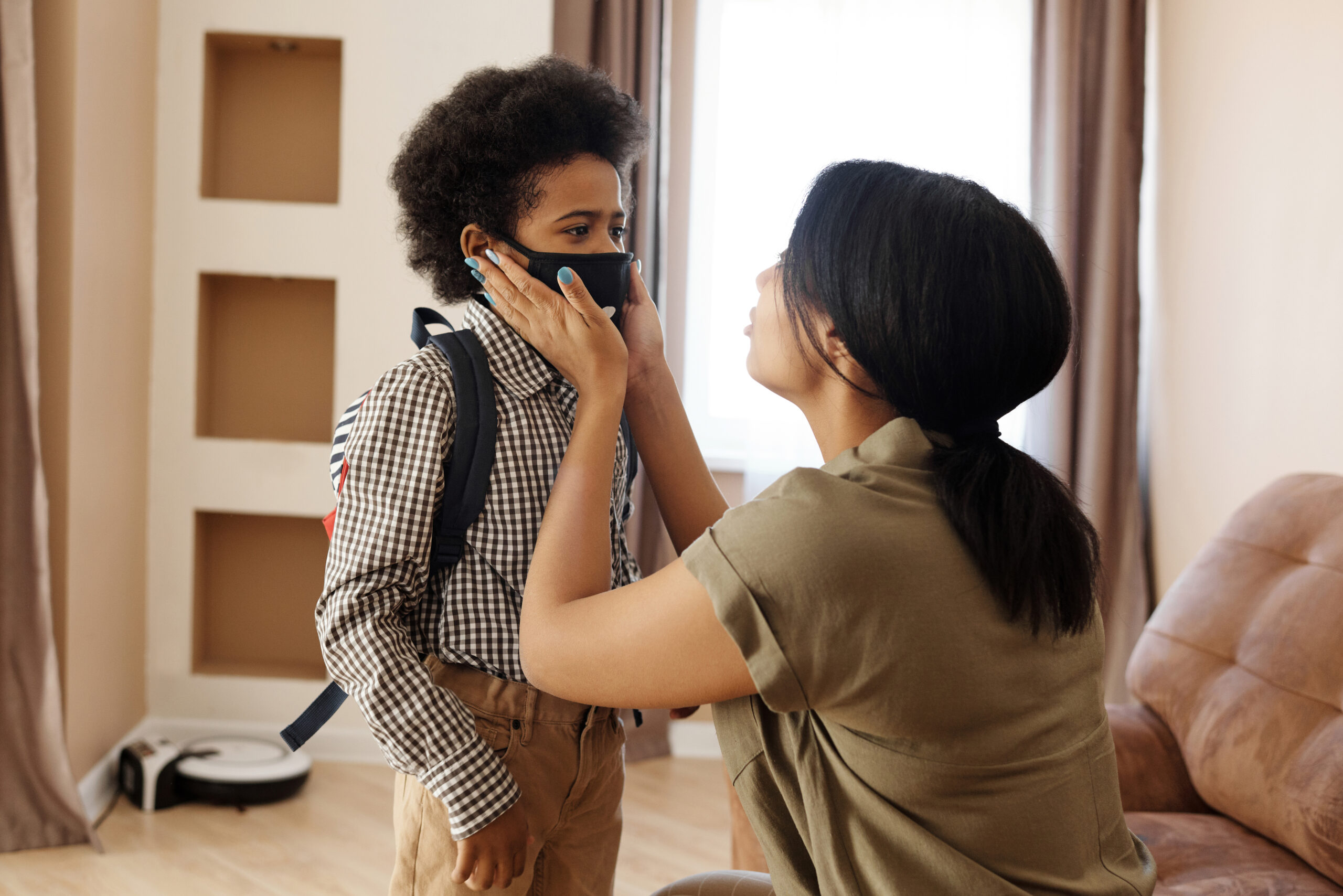
We’ve been living with COVID-19 for many months and it will probably be with us for many more months if not years. Not surprisingly, it’s hit communities of color particularly hard. This article was written to help individuals in African-American and Latinx communities deal with the Rona in the event that it enters their homes.
I’ve gathered a lot of information and come to the following basic conclusions. It has to be acknowledged that for houseless individuals and families, much of these suggestions will need to be adapted or simply impossible to achieve. Time permitting, we’ll do a follow-up that addresses the particular concerns of those members of our communities who are unhoused.
- Rest is important but hydration is crucial
- Foods rich in Vitamin C will help your immune response. Zinc and Vitamin D are also helpful.
- Acetaminophen is probably the best option for fever control, unless you have liver disease. In which case you should use Ibuprofen. Both should be taken as directed.
- Home remedies like herbal tea with honey and lemon are your best option for a cough but is probably just as important for hydration.
- A basic understanding of the Active Cycle of Breathing Technique is helpful if things get rough
- More important than any of the above, is the need for a support system that will provide support throughout the illness and recovery period
The rest of this article explains the above conclusions. I am not a doctor so you’ll find links to my sources throughout the article. If you believe the sources to be trustworthy then follow the advice that they give. If they sound iffy to you, see if you can find the same information from a source that you trust. If you can’t, then take the info with a grain of salt. You should do all of those things for any information that you find on the Internet, but that’s especially true for anything related to COVID-19.
Self-Isolation Does Not Equal Going It Alone
If you are sick and living alone then you must let people know that you’re sick. Ideally, we’d have a government that could do contact tracing without extensive privacy violations. Contact tracing is essentially finding anyone who has had physical contact with an infectious individual, testing them, monitoring them and if necessary putting them in quarantine. But since that’s not likely to happen, you should do what you can to protect your community. You may not have the energy to do more than share the fact that you’re ill on Facebook and your other social media accounts but frankly that’s better than what the government is doing.
The other reason you should let people know, especially if you live alone, is because you’re going to need support. Someone will need to bring you food, medicine and to help you monitor your symptoms in case things take a turn for the worse. Those who take on the role of caregiver, should also find support. Caregivers in households without a separate bathroom or possibly even a separate bedroom for anyone who might come down with the virus cannot avoid the risk of catching the virus themselves. Setting up a support system that can help safely deliver groceries, medicine and other supplies will help protect the family and the wider community.
Don’t Treat COVID-19 Like the Flu
Once you’ve set up a support system, you can concentrate on caring for yourself or providing care for your loved one(s). COVID-19 appears to be roughly twice as contagious as the flu and so way more deadly. The importance of avoiding contamination and being scrupulous about hygiene cannot be overstated.
Anyone who is sick but not hospitalized should isolate themselves from other members of the household. The CDC gives some specific guidelines for people taking care of themselves and for those who are taking care of others. It’s important to wear a mask when in the same room with someone who has COVID-19. Eating in the same room is a no no. Wearing rubber gloves in public doesn’t always make sense because the gloves themselves can carry the virus. Washing hands often and particularly whenever you come home makes more sense. On the other hand, when caring for someone at home, rubber gloves are imperative when doing laundry and dealing with bodily fluids. Sharing a bathroom is truly problematic and requires cleaning after every use.
The CDC advises that you stay hydrated, get plenty of rest, try to control your fever and contact your doctor if your symptoms get worse. Their suggestions are a bit more in-depth if your in a high-risk category— those who are immune compromised, have diabetes, heart and lung disease, etc.
But who’s in a high-risk category isn’t as obvious as it may seem. If you are uninsured or under-insured, there’s a good chance that you may have an underlying condition but not know about it. Or you may suspect that there’s a problem but you don’t have the time or the resources to have it treated. These are just two of the many reasons that the life expectancy is lower in communities of color and African-Americans in particular have been dying at higher rates of COVID-19. Let’s face it, white supremacy is the underlying condition that puts people of color and particularly Black people at higher risk.
As the CDC doesn’t have instructions for dealing with racism, we’ll start with their basic instructions. Getting plenty of fluids and rest is straightforward enough. Including soup in your meal prep is a good idea because it can be frozen and ready on hand. You’ll need to drink plenty of fluids. Water is best but also boring. Despite this, you should avoid sugary drinks and stick with clear fluids like low-sodium broth. Because of its electrolytes, Gatorade is popular for rehydration but those who are or might be diabetic should stick to the low calorie versions. Alcohol should be avoided all together.
Over the Counter Medications
Trying to control your fever is a trickier issue because your body uses heat to fight infections. If you can withstand a low-grade fever (under 101 degrees) you might recover quicker. On the other hand, if a fever spikes, then the fever itself might do more harm than good. Healthline.com advises using Acetaminophen (commonly sold under the brand name Tylenol) to control your fever. You might prefer Ibuprofen because it also helps control inflammation and may help with body aches. However, the FDA reminds us that NSAIDs like Ibuprofen can diminish the utility of diagnostic signs in detecting infections. On the other hand, acetaminophen is hard on the liver, so it should be taken with caution and avoided all together if you have liver disease.
Acetaminophen and ibuprofen both have plusses and minuses. The choice depends on any underlying conditions the patient might have. If no pre-existing conditions exists, and again, this can be difficult to verify, rotating between the two every three hours or more is a practice commonly used by medical professionals.
When I feel a cold coming on, the first thing I take is a multi-symptom cold medicine like Theraflu and go to bed. But multiple sources, advise against this not only for COVID-19 but also for patients with underlying conditions like diabetes and heart disease because many of the active ingredients interfere with other medications. Severe cases of COVID-19 have caused damage to internal organs and some of the ingredients in a multi-symptom medicines could exacerbate that problem. So stick with acetaminophen and/or ibuprofen for fever and body aches.
Cough is a common symptom. However, Consumer Reports suggests that cough medicines are not terribly effective for COVID-19. Warm, steamy showers, lozenges or herbal teas with honey are better options. Herbal tea also helps keep you hydrated, which is crucial. If you’re coughing so much that you can’t rest then a cough medicine that uses dextromethorphan like Delsym or Robitussin is best because it is safe for both diabetics and people with high blood pressure. Again, cough syrups with more than one active ingredient should be avoided.
Vitamins and Nutrition
In addition, healthline.com suggests that the anti-viral properties of zinc might be helpful. Vitamin C supports the activity of immune cells but is most helpful when taken in the form of food. So don’t skimp on citrus fruits and vegetables like red peppers, Brussels sprouts, cabbage, cauliflower, spinach and other leafy greens.
Vitamin D should also be considered. Low vitamin D levels are associated with auto-immune diseases like diabetes, which also worsens COVID-19 outcomes. Because our main source of Vitamin D is the sun and darker skin is less sensitive to the sun, darker people are more susceptible to auto-immune diseases. There are studies that suggest that Vitamin D might help with COVID-19 specifically. With or without a pandemic, Blacks and Latinos should consider Vitamin D supplements.
Active Cycle of Breathing Technique
For patients who have difficulty breathing, the Active Cycle of Breathing Technique (ACBT) can increase oxygen levels. ACBT is most commonly used for people with breathing disorders like Chronic Obstructive Pulmonary Disease or COPD and is described in detail by the American Lung Association and is demonstrated in the video below.
Try watching this video on www.youtube.com,
In the video, the doctor takes a deep breath through the mouth and holds it in for five seconds before releasing it. Others recommend breathing in through the nose and out through the mouth to avoid irritating the throat. Repeat the breaths five times, before finishing a final round of breathing with a big cough. Coughing is controversial because it might help spread the disease. But everyone agrees that deep breaths encourage air into the depths of the lungs. With shallow breaths, the entire lung doesn’t fill up. If pockets within the lungs aren’t used, they can close and increase the risk of infection. So keep practicing those deep breaths.
Tracking Symptoms
While taking care of yourself or someone else, it’s important to monitor symptoms. Keeping a diary that records symptoms on a daily or even hourly basis can be invaluable when talking to a doctor who might otherwise dismiss the severity and/or an escalation of symptoms.
As you record symptoms, make sure to include even things that don’t seem related to COVID-19. Most cases that become serious are due to the onset of Acute Respiratory Distress Syndrome (ARDS) or pneumonia. But doctors are discovering that many COVID-19 patients whose main symptoms are gastrointestinal never develop respiratory illness. Back pain can be an indication that your kidneys are under attack. Those with a history of autoimmune disease may be susceptible to cytokine storms, etc. So record everything.
Those who have an undiagnosed condition won’t know what symptoms to be concerned about. This group is disproportionately the uninsured, the under-insured and those whose symptoms are regularly downplayed or ignored by medical professionals, i.e., Black people. To combat racist attitudes that you might encounter when seeking treatment, keep a diary of your symptoms and how they’re progressing. The more detailed information you can give to your doctor, the better. They are less likely to ignore symptoms that are documented this way. Racism or not, having this information can help medical professionals make informed decisions about the trajectory of the disease and how fast it’s progressing.
When to Go to the Hospital
The progress of COVID-19 does not follow a predictable pattern. Symptoms may be serious from the very beginning or it may feel like a bad flu for weeks and then suddenly go south very fast. How do you know if hospitalization is necessary? According to Web MD you should seek treatment if you have the following symptoms:
- Problems breathing
- Constant pain or pressure in your chest
- Bluish lips or face
- Sudden confusion
Depending on your pigmentation, bluish lips or face may not occur despite the serious worsening of symptoms. But pressure in the chest, confusion and problems breathing all indicate that you may not be getting enough oxygen.
Depending on your pigmentation, bluish lips or face may not occur despite the serious worsening of symptoms. Pressure in the chest, confusion and problems breathing all indicate that the patient may not be getting enough oxygen. Medical attention should also be sought if there are symptoms that are new or worsening or if they prevent the patient from doing normal activity. This includes symptoms that are not related to breathing. As we learn more and more about the disease, it’s clear that it presents differently in different people. For those who are knowingly at a higher risk, a doctor might be able to tell you what symptoms to be concerned about beyond those listed above.
The biggest concern for a coronavirus patient is shortness of breath, because it’s an indicator of Acute Respiratory Distress Syndrome (ARDS) and pneumonia. A feeling of tightness in the chest, pain, or the sense of drowning when lying down indicates that you’re not getting enough oxygen. It can lead to disorientation that makes it difficult to call for help. Which leads us back to the importance of monitoring your symptoms and letting people know that you’re sick and asking them (or allowing those who’ve already offered) to check in on you regularly.
If the hospital decides that the patient’s symptoms are not serious enough to warrant admission and you disagree, then it’s probably time to put up a fight. In my experience, taking names and threatening legal action can be effective. The role of advocate cannot be taken on by someone suffering from a severe case of COVID-19, which is another reason it’s important to seek help from friends or family. Being a healthcare advocate for a person of color is also an excellent way for an anti-racist white person to make good use of their privilege.
Black folk are used to being told to suck it up and walk it off. Because life for so many of us is simply more difficult than the white majority in the country, many believe that we are in fact stronger and can walk off illness and injury. Given the incredibly disproportionate number of deaths within African-American communities, this practice is simply unacceptable. If we are to survive, we must do everything that we can to take care of ourselves, our families and our communities. In the long-term, we will continue to fight for equity and justice. In the meantime, surviving a pandemic within a system designed to shorten our lives is a revolutionary act. Be a revolutionary.
By: Liane Scott | Wayfinder Fellow | August 2020


